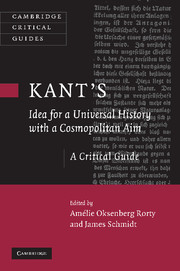Book contents
- Frontmatter
- Contents
- List of contributors
- List of abbreviations
- Introduction: history as philosophy
- Idea for a Universal History with a Cosmopolitan Aim
- 1 Teleology and history in Kant: the critical foundations of Kant's philosophy of history
- 2 The purposive development of human capacities
- 3 Reason as a species characteristic
- 4 Good out of evil: Kant and the idea of unsocial sociability
- 5 Kant's Fourth Proposition: the unsociable sociability of human nature
- 6 The crooked timber of mankind
- 7 A habitat for humanity
- 8 Kant's changing cosmopolitanism
- 9 The hidden plan of nature
- 10 Providence as progress: Kant's variations on a tale of origins
- 11 Norms, facts, and the philosophy of history
- 12 Philosophy helps history
- Bibliography
- Index of names and works
12 - Philosophy helps history
Published online by Cambridge University Press: 28 July 2009
- Frontmatter
- Contents
- List of contributors
- List of abbreviations
- Introduction: history as philosophy
- Idea for a Universal History with a Cosmopolitan Aim
- 1 Teleology and history in Kant: the critical foundations of Kant's philosophy of history
- 2 The purposive development of human capacities
- 3 Reason as a species characteristic
- 4 Good out of evil: Kant and the idea of unsocial sociability
- 5 Kant's Fourth Proposition: the unsociable sociability of human nature
- 6 The crooked timber of mankind
- 7 A habitat for humanity
- 8 Kant's changing cosmopolitanism
- 9 The hidden plan of nature
- 10 Providence as progress: Kant's variations on a tale of origins
- 11 Norms, facts, and the philosophy of history
- 12 Philosophy helps history
- Bibliography
- Index of names and works
Summary
After a great many surprising statements Kant's essay Idea for a Universal History with a Cosmopolitan Aim offers the reader a truly amazing one in the end: namely, that the description of history that Kant envisages may itself contribute to history's moving towards the aim that history, in that account, is said to have. That aim, the “cosmopolitan aim” of the essay's title, is “the perfect civil union of the human species” (8:29), and Kant claims that philosophers describing history as pursuing that aim thereby help history to reach it. In what follows I shall investigate first what this help is supposed to consist in and second on what grounds Kant can claim that philosophy will be helpful in this way.
Here is the Ninth Proposition, the passage putting forward Kant's claim most explicitly:
A philosophical attempt to work out universal world history according to a plan of nature that aims at the perfect civil union of the human species, must be regarded as possible and even as furthering this aim of nature.
(8:29)“Possible” presumably means something like “feasible” here, since merely to claim that one could make the attempt so to describe history would seem trivial – of course one can try that. In calling this enterprise possible, Kant is probably asserting that it can be completed, that this enterprise is not bound to fail. On what this confidence is based need not concern us at the moment.
- Type
- Chapter
- Information
- Kant's Idea for a Universal History with a Cosmopolitan Aim , pp. 231 - 249Publisher: Cambridge University PressPrint publication year: 2009
- 2
- Cited by



